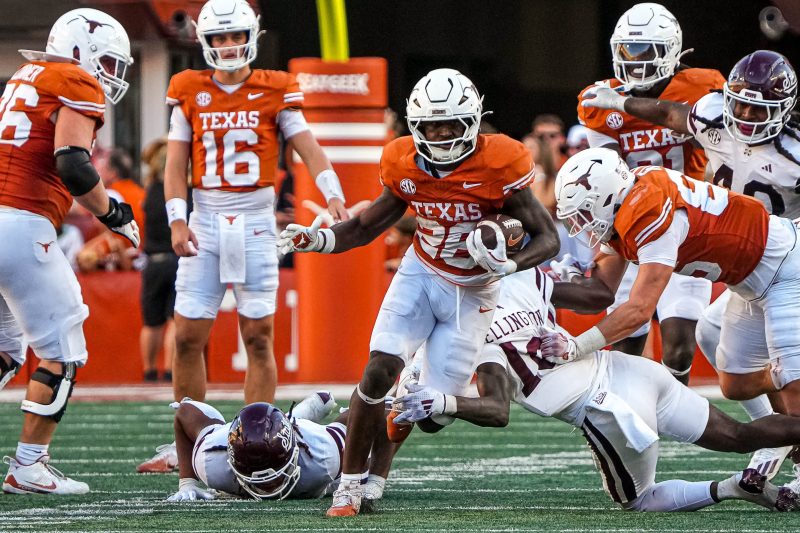
Who wins the playoff? Ranking the contenders from No. 1 to No. 12
Oregon is only just barely the favorite to win the national championship. Who could forget Texas and Georgia?
Ohio State, Tennessee drew difficult paths to national championship.
Notre Dame lurks as ultimate wild card in College Football Playoff.
Most years within the four-team playoff era, if offered the chance to pick one team to win the national championship or accept the other three, I’d take my top pick and give you the field.
The 12-team playoff, coupled with this season’s lack of a juggernaut, alters that logic.
No. 1 Oregon, as the nation’s only undefeated team, enjoys favorite status, but barely. The Ducks’ challenging bracket placement might require them to tackle No. 8 Ohio State and No. 5 Texas just to reach the national championship game.
“It’s not supposed to be easy,” Oregon coach Dan Lanning said on ESPN after the Ducks learned their draw.
Not in this format, anyway.
Here’s how I’d rank the 12 teams in the bracket, in order of lowest chance to win the national championship to best chance.
Note: This is not a pure power ranking of teams. Rather, it takes into account how strong each team is, combined with its bracket placement and path toward a championship.
12. SMU (No. 11 seed)
The Mustangs join Indiana and Texas as the only teams in the playoff that own no victories against teams currently ranked in the playoff top 25. Rhett Lashlee’s quarterback change in September to Kevin Jennings trigged an SMU rise resulting in a surprise playoff bid, but first-round opponent Penn State poses a stiffer test than any the Mustangs faced within a favorable ACC schedule.
11. Clemson (No. 12 seed)
Credit Dabo Swinney’s squad for rallying into the playoff after suffering a blowout defeat in a season opener against Georgia, but consider that game a harbinger of what awaits in the playoff. Clemson will encounter tough sledding at first-round opponent Texas. Even if the Tigers spring an early upset, they’re on Oregon’s side of the bracket.
10. Indiana (No. 10 seed)
Curt Cignetti deserves coach of the year honors for his first-year achievements at Indiana, taking the Hoosiers from 3-9 to 11-1. Indiana specialized in crushing bad and average teams. A neat parlor trick, and one that requires talent, but in its lone game against a playoff qualifier, Indiana flopped at Ohio State. Playing at Notre Dame in the first round is no easy way to start.
9. Arizona State (No. 4 seed)
The Sun Devils are hot. Their six consecutive victories include a Big 12 championship rout of Iowa State. Running back Cam Skattebo emerged as one of the nation’s most enthralling players, but he could run into a wall of Texas run defense in the quarterfinals that may be too difficult for Arizona State to overcome.
8. Boise State (No. 3 seed)
The Broncos didn’t require any charity to qualify for the playoff. They’d be in, even if this format didn’t reserve a spot for the Group of Five. Their résumé exceeds that of at-large qualifiers like Indiana and SMU. Ashton Jeanty emerged as appointment viewing, but can Boise State’s pass attack provide enough balance to beat teams like Penn State or Georgia in successive fashion? That’s a fair question.
7. Tennessee (No. 9 seed)
Tennessee’s defense compares to elite units at Texas, Ohio State and Notre Dame. The group carried the Volunteers to this point, but they face a tough avenue that begins at Ohio State – Tennessee struggles on the road – and would continue against Oregon. Also, quarterback Nico Iamaleava reached 200 passing yards against just two SEC opponents.
6. Penn State (No. 6 seed)
Penn State presents as the light-beer version of 2023 Michigan. That’s not really a dig – 2023 Wolverines Light sounds pretty good, actually – but is that enough to win four playoff games? The Nittany Lions received a coveted bracket draw. They would not encounter Oregon until the national championship game or Georgia until the semifinals. But, Penn State under coach James Franklin has a history of losing big games, including losses to Ohio State and Oregon this season. That’s tough to ignore.
5. Ohio State (No. 8 seed)
The Buckeyes ooze talent, and they join Oregon and Georgia as the only teams in this field to beat multiple playoff qualifiers, but their offensive line is down two starters, and the loss to Michigan contributed to the Buckeyes receiving an arduous path to the national championship. Their route would include Tennessee, Oregon, possibly Texas in the semifinals and someone like Georgia, Notre Dame or Penn State in the national championship. That’s awfully rugged.
4. Notre Dame (No. 7 seed)
The Irish finished the regular season at peak stride, and they drew the more favorable side of the bracket. Few opponents found much success slowing their ground game or attacking Notre Dame’s defense. The question centers on whether Notre Dame’s light schedule adequately prepared it for the rigors of needing to win four playoff games against a caliber of opponent it hasn’t faced. Maybe, the Irish lurk as the best team this side of Oregon. Or, maybe, they’re a byproduct of a forgiving schedule. They’re the ultimate wild card.
3. Georgia (No. 2 seed)
Georgia earned a first-round bye at the expense of losing its starting quarterback. Carson Beck (elbow) is out indefinitely, but I hesitate to dramatically alter Georgia’s outlook. After all, Beck struggled at times this season. Gunner Stockton, a well-regarded backup, engineered Georgia’s rally in its SEC championship victory. The more pressing question surrounds Georgia’s supporting cast, which doesn’t measure up to Kirby Smart’s past three teams. Count Georgia out at your own risk, though. No team owns more wins against playoff qualifiers.
2. Texas (No. 5 seed)
The Longhorns lack a win against a playoff qualifier, but so do seven other teams in this bracket, and the only team to beat Texas (Georgia, twice) resides on the far side of the bracket. The Longhorns’ defense fuels this engine. Their offensive line handled every opponent except Georgia. They’ll be a decisive favorite in their first two games – Clemson and Arizona State. The question: Is Quinn Ewers a quarterback with whom Texas can win a national championship? He’s been fine, though rarely spectacular. Texas will need him to perform at a higher gear if it runs into an opponent like Oregon, but the rest of the pieces are in place.
1. Oregon (No. 1 seed)
Oregon possesses the playoff’s best quarterback, and it is unencumbered by glaring weakness. That’s an enviable combination. Don’t overlook the Ducks’ offensive line, either. That unit suits the Big Ten. The Ducks endured multiple tough tests throughout the season and kept coming out on top. The playoff draw did Oregon few favors. If the choice is Oregon or the field, take the field. If the choice is between Oregon or my pick of another team, give me Oregon.
Blake Toppmeyer is the USA TODAY Network’s national college football columnist. Email him at BToppmeyer@gannett.com and follow him on X @btoppmeyer. Subscribe to read all of his columns.
